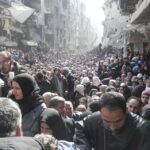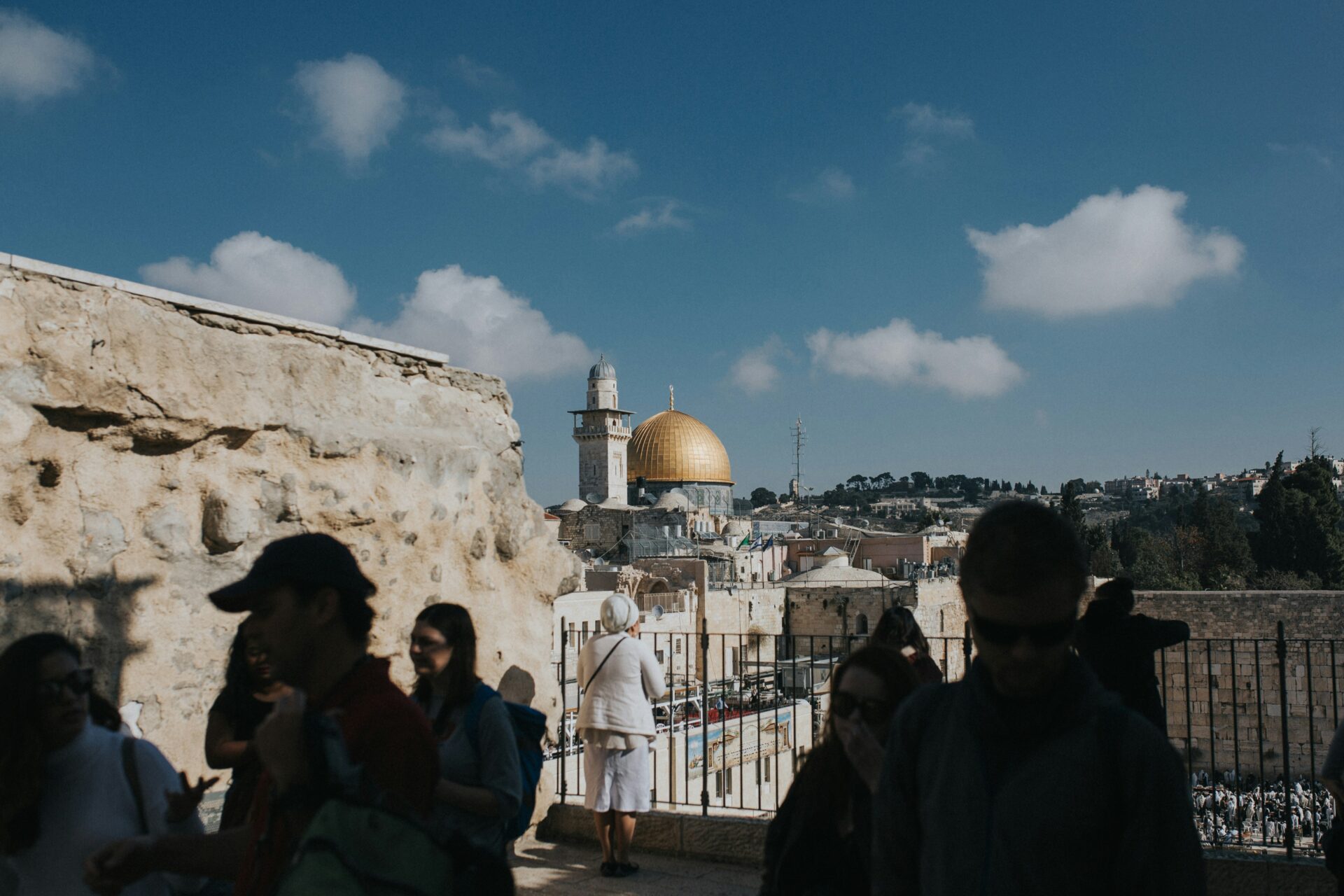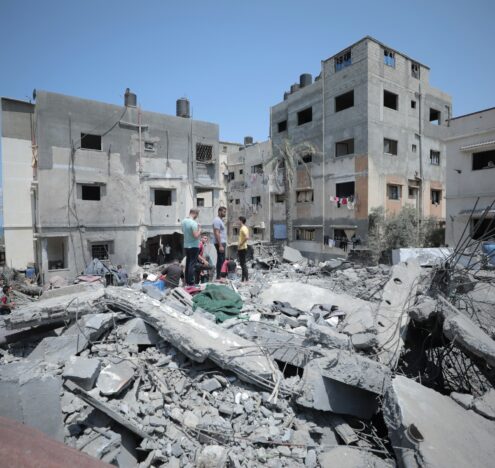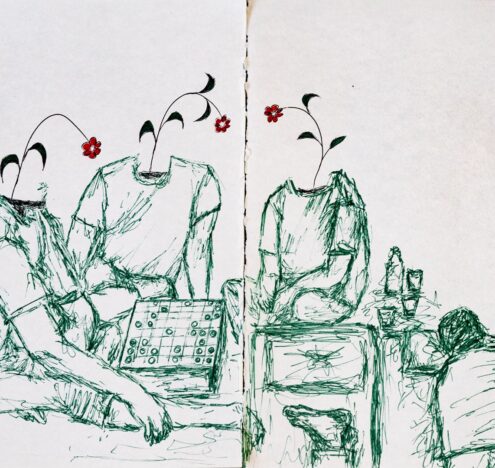People routinely refer to the ongoing genocide in Palestine as a “religious conflict,” but it’s just as much about race, culture, and capital.
Growing up in Morocco, where, to put a twist on Sarah Palin’s infamous claim, “I could see Spain from my home.” My mother and I devotedly watched Eurovision every year. As we joked about sequins and delightedly yelled “nil points!” whenever it was Great Britain’s turn, I noticed that not all the countries represented were European. Israel almost always sponsored a performance replete with sparkles, high drama, and just as much splendor and chaos as every other country’s entries. But why was Israel more European than Morocco, which lies a mere 8.8 miles away and has only appeared on Eurovision once?
In my American school in Morocco, I, of course, learned about the horrors of the Holocaust. I also learned about the conflict, genocide, and cultural annihilation that Palestinians have endured since 1948.
Much like Cyril Radcliffe caused the violent chaos of the partition of India and Pakistan, some other British civil servants with a map and a lack of cultural competence or care redefined land that did not belong to them. With the flick of a pen and some heavy-duty artillery, the country of Israel was born in 1948. And with its birth, came the continued displacement, dispossession, and deaths of Palestinians. But this isn’t about the political history of Israel and Palestine or even about a non-European country competing in Eurovision, it’s about the framing of Israeli identity and sovereignty as above reproach.
Birthright Trips
Upon coming to the United States, I made friends from a number of faith groups, many of whom were Jewish Americans who passionately spoke about “Birthright.” When I asked what that was, I was told that all Jewish Americans had the “birthright” to visit their “homeland” of Israel. As a poor international student, I likely responded with something along the lines of, “Free travel? So cool!” or, “I wish someone would help pay for me to go home and see my family this year.”
Friends and acquaintances received neither response particularly well. The granddaughter of a proud Amazigh man, I firmly believe our human rights are connected to our cultural roots. As a scholar in education for social justice, I have seen the harm done when racially marginalized communities are denied access to their traditions in the interests of assimilation.
And as the lone Muslim on my college campus, I also know the heartache of being “the only” and not having the opportunity to connect with people of shared faith backgrounds. I appreciated and continue to appreciate the need for global community building for folks who have felt pushed into the margins because of their beliefs.
After chatting to college peers about their trips to Israel, I looked up “Birthright,” expecting to see images similar to those family members’ pilgrimages to Mecca. Instead, I saw stunning images of Middle Eastern shorelines, delicious food, and entertaining nightlife with mild allusions to sacred pilgrimages and faith-based programming. My confusion continued.
Educational Tourism
As of 2024, Birthright Israel is the world’s largest educational tourism program in the world, having organized almost a million free visits to the country. This educational tourism not only nurtures Jewish community as it claims, but it aims to bolster support for Israel in Americans aged between 18 to 26. College-aged Jewish adults, regardless of income level, who are eager for world-expanding experience and a Study Abroad experience, learn that they can travel to Israel at no cost; what’s not to love?
It is telling that no such arrangement exists with Morocco, for example, which was the first country in the world to recognize US independence. What would global political and Western rhetoric say about Islam if Americans had equal opportunity to visit Muslim countries? What if American travel was funded to countries whose identities were not so rooted as diametrically opposite to Muslim cultures?
As the lone Muslim on my college campus, I also know the heartache of being “the only” and not having the opportunity to connect with people of shared faith backgrounds.
There are no other programs that promote this level of cultural understanding, which leaves a vacuum of opportunities to develop understanding or empathy about other Middle Eastern faiths and cultures.
And the positioning of Israel as Western and progressive extends beyond faith-based communities to another marginalized group.
Pinkwashing
As a member of another marginalized group, the LGBTQIA community, I attended many pride events while I was an undergraduate. I noticed that every pride parade had a strong pro-Israel presence and an unspoken understanding that Israel was a beacon of light in the Middle East compared with those Muslims.
As a queer Muslim, I strived to broaden the conversation to say, “LGBTQIA+ communities are literally everywhere.” Still, people who have never visited my home country shut me down with Islamophobic quips. This pinkwashing framed Israel as superior to and more progressive than any of the Muslim-majority countries in the region. Given Israel’s framing as an oasis amid a desert of regressive hate, many queer peers confidently tried to teach me about my own religion and heritage as though I did not exist; as though I, a happily queer Muslim, could not nor should not exist.
The Erasure of Islam
The image of Israel as a beacon of Westernized wisdom in a holy land (that is equally holy to Muslims) has led to the ubiquity of language such as the word Judeo-Christian, a phrase that ignores the profound similarities and values that Islam shares with Judaism and Christianity. Such erasure of Islam as being in community and congruence with Abrahamic faiths only deepens the cultural divides that geopolitical Islamophobia has entrenched in American hearts and minds.
Such rhetoric has inspired rampant post-9/11 xenophobic hate crimes and former President Trump’s Muslim Ban. If the US blocked any other faith group from entering the country, many would point to the First Amendment. But because of the deep ideological chasm Western leadership has constructed between the Muslim-majority Middle East and the so-called “first-world,” the Supreme Court largely upheld the Muslim Ban. (Joe Biden overturned the ban upon entering office, but activists say lawmakers should put in place protections to ensure that such orders don’t return.)This rhetoric goes on to remove Islam from Abrahamic traditions and Muslim people’s equally just claim to live in peace on holy land.
As of this writing, the death toll in Gaza since Oct. 7, 2023 has exceeded 32,000 Palestinian lives. And while Israel has failed to comply with the International Court of Justice’s ruling to prevent acts of genocide, the country still has the hearts and moral sympathies of the West, with leaders in some powerful countries, including the US and the United Kingdom refusing to call for a permanent ceasefire.
The West’s Shadow
As Israeli soldiers block provisions to starving civilians in Gaza in direct violation of a globally recognized court, pro-ceasefire activists face shadow-banning online and termination from their jobs amid allegations of antisemitism. To seek to protect life is not anti-anything. However, the educational institutionalization of Israeli identity and the West’s shameful shadow of World War II have obfuscated what is clearly a question of human rights. Starving Gazan children, of all ages, are called terrorists as they die in fear and destitution. Meanwhile, the Global North either abstains from acknowledging their role in this fiasco or vitriolically calls any voices of dissent for the status quo (i.e. anyone who supports a ceasefire and questioning Israel’s motives) an antisemite.
This genocide has been long in the making. It began a century before Oct. 7, though Western media would have us believe otherwise. Global complicity in the ongoing occupation relies on the cultural ideology that Israel, while symbolic of the exotic, white-friendly (read: civilized) Middle East, is also not of the savage (read: Arab, Muslim) Middle East. To unlearn such latent and active layers of Islamophobia and MENA cultural annihilation will take as much time and as many resources as it took to build so many myths about a people who are just as deserving of life and dignity as anyone else. No one deserves bombs or starvation for the actions of a few. No one deserves the role of the villain in everyone’s story without the opportunity to tell their own.





















